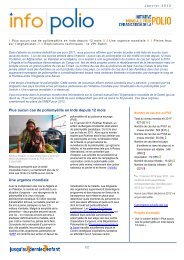national primary health care development agency - Global Polio ...
national primary health care development agency - Global Polio ...
national primary health care development agency - Global Polio ...
You also want an ePaper? Increase the reach of your titles
YUMPU automatically turns print PDFs into web optimized ePapers that Google loves.
1. INTRODUCTION<br />
Version 13312<br />
In 2010, the polio eradication efforts in Nigeria registered significant success as the country experienced a 95%<br />
decline in confirmed polio cases as compared to 2009. Improved quality and coverage of immunization activities<br />
that resulted from very strong involvement of Political, Traditional and Religious leaders down to the community<br />
level in the highest risk States and Local Government Areas (LGAs) contributed to this success.<br />
The progress registered in 2010 was not sustained in 2011 as Nigeria experienced persistent transmission of all 3<br />
serotypes of poliovirus, with a 3-fold in cases due to wild poliovirus as compared to 2010. Eight states experienced<br />
wild poliovirus transmission in 2011 [Borno, Jigawa, Kano, Katsina, Kebbi, Sokoto, Yobe and Zamfara] while 10<br />
states experienced transmission of circulating vaccine derived poliovirus [Bauchi, Borno, Jigawa, Kano, Katsina,<br />
Niger, Plateau, Sokoto, Yobe and Zamfara].<br />
In May 2011, the Federal Government of Nigeria developed a <strong>Polio</strong> Eradication Emergency Action Plan with a goal<br />
of intensifying polio eradication efforts. Implementation of this plan was sub-optimal, particularly in the highest<br />
risk areas. Some factors that contributed to the sub-optimal implementation of the 2011 PEI Emergency plan<br />
included insufficient buy-in by State and LGA authorities, insufficient human and financial resources, low<br />
accountability amongst programme implementers and stake-holders as well as increasing insecurity in several<br />
areas.<br />
The failure to implement priority activities included in the 2011 Emergency action plan contributed to a decline in<br />
the quality and coverage of both immunization and surveillance activities in the highest risk states. The 22 nd<br />
session of the Expert R eview Committee on <strong>Polio</strong> Eradication, and Routine Immunization in Nigeria (ERC) that<br />
met in Abuja in October 2011 noted that “transmission of all poliovirus types is primarily being detected in known<br />
high risk LGAs, most of which demonstrate consistent problems in achieving high immunization coverage during<br />
IPDs”.<br />
Nigeria is determined to achieve interruption of poliovirus transmission within the shortest time possible. The<br />
Federal Government of Nigeria, with support of <strong>Global</strong> <strong>Polio</strong> Eradication Initiative (GPEI) partners has developed a<br />
<strong>Polio</strong> Eradication Emergency Plan for 2012 that has taken into account the important lessons from 2011. Extensive<br />
consultations during the <strong>development</strong> of the 2012 plan have been had with State and Local Government<br />
authorities as well as with GPEI partners. A bottom up approach with emergency plans developed by States and<br />
Local Government Areas contributing to the finalization of the 2012 <strong>national</strong> <strong>Polio</strong> Eradication Emergency Plan<br />
was adopted.<br />
The main technical areas of focus of the 2012 PEI emergency plan include (a) enhancing SIA quality to reach all<br />
children, with specific focus on the chronically missed children (b) intensified advocacy, behavior change<br />
communication and mobilization at all levels (c) accelerating routine immunization delivery and (d) enhancing<br />
surveillance for poliovirus detection.<br />
New implementation modalities have been put in place to ensure more effective implementation of the 2012<br />
<strong>Polio</strong> Eradication Emergency Plan. On 1 March 2012, His Excellency President Goodluck Jonathan inaugurated a<br />
Presidential Task Force on <strong>Polio</strong> Eradication (PTFoPE). This Task Force, chaired by the Honorable Minister of State<br />
for Health, has membership drawn from the National Assembly, Nigeria Governors Forum, Northern Traditional<br />
Leaders Committee on Primary Health Care, States, Federal Ministry of Health and Partner Agencies. The<br />
Executive Director of the National Primary Health Care Development Agency (NPHCDA) is the secretary of the<br />
PTFoPE. The main goal of the PTFoPE is to provide leadership support to Nigeria’s efforts to accelerate<br />
6




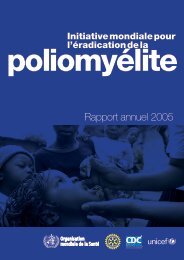
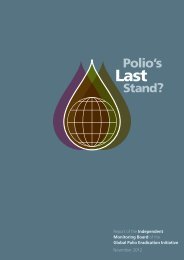
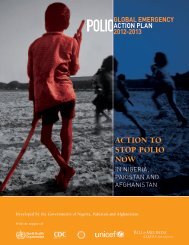
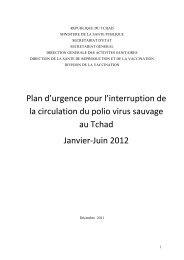
![English [pdf 2MB] - Global Polio Eradication Initiative](https://img.yumpu.com/6380394/1/190x245/english-pdf-2mb-global-polio-eradication-initiative.jpg?quality=85)
